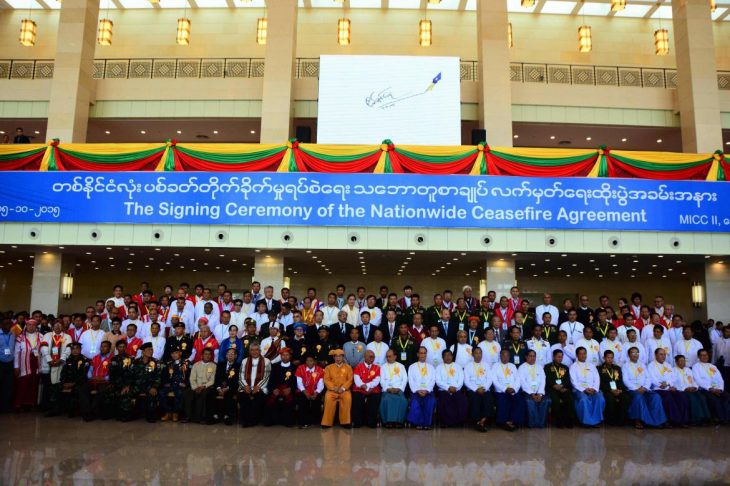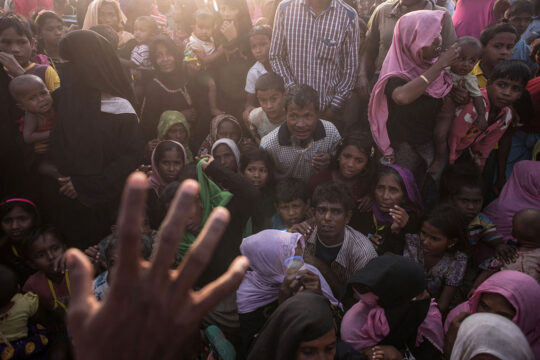In Myanmar, October 15 marked the first anniversary of the signing of a Nationwide Ceasefire Agreement (NCA) between the previous government of U Thein Sein and eight armed groups. Oliver Slow of independent publication Frontier Myanmar looks at hopes for peace one year on, under the National League for Democracy (NLD) government of Aung San Suu Kyi. This article first appeared in Frontline Myanmar on October 15.
Although celebrated as a step forward in the country’s decades-old civil war, the deal fell well short of the government’s hopes of sealing a truly nationwide ceasefire before the end of their term.
That task has now been handed to the National League for Democracy, which has used the impressive mandate it won in last November’s election to try and help the country achieve “peace and national reconciliation”.
In contrast to the previous government, State Counsellor Daw Aung San Suu Kyi has made all-inclusivity a key component of her aims. The Thein Sein administration’s exclusion of three groups – the Ta’ang National Liberation Army, the Arakan Army and the Myanmar National Democratic Alliance Army – from the peace process was a crucial factor in the decision of other groups not to sign the NCA, despite having already agreed on its content.
The hangover of that distrust has been keenly felt in the first few months of the NLD’s term.
The three groups were barred from participating in the landmark 21st Century Panglong Union Peace Conference because of a disagreement over the wording of a statement in which they would commit to giving up arms in the future.
When the event got underway in Nay Pyi Taw on August 31, there was further embarrassment when a delegation from the United Wa State Army – the largest and most influential ethnic armed group – walked out on the second day over a misunderstanding about the group’s status at the talks.
“Panglong-21 was important for its inclusive nature, and the opportunity for ethnic leaders to express their concerns and aspirations to a national audience,” said Mr Richard Horsey, an independent political analyst. “But many groups attended not out of support for the process, but because they considered they had no alternative. Many felt that they were treated poorly and the conference was badly organised.”
For this reason the event was only a “qualified” success, he said.
Recent flare-ups of fighting in different parts of the country have added to the challenges of achieving truly nationwide peace.
In September, fighting broke out in Kayin State between a splinter group of the Democratic Karen Benevolent Army, which signed the nationwide ceasefire last year, and a joint force of the Tatmadaw (national army) and its allied Border Guard Force. Up to 4,000 residents were reportedly forced to flee due to the conflict.
Less than a month later, thousands more were displaced following a skirmish between the Tatmadaw and the Shan State Army-South, the armed wing of the Restoration Council of Shan State, which also signed the NCA.
There has also been renewed fighting in Kachin State between the Tatmadaw and the Kachin Independence Army. Myanmar’s most northern state has been one of the most active regions for conflict since a 17-year ceasefire broke down in 2011.
U Khin Maung Myint, an NLD Amyotha Hluttaw (Upper House) MP for Kachin-9, believes the fighting is the result of a split between Tatmadaw members.
“There are some [in the Tatmadaw] who want to follow Daw Aung San Suu Kyi towards finding peace in the country, but there are others who do not trust the KIA and the government. There is a disunity in the Tatmadaw,” he told Frontier by telephone.
He added that he believes that the KIA is committed to peace and that a federal system will be key to them signing the NCA.
Aung San Suu Kyi and her government has not commented on the fighting, an indication of the tough relationship she has to balance with the military.
In a statement released by its Central Committee on October 8, the Kachin Independence Organization said that the military’s offensives in the state were “undermining and interrupting the genuine peace process, which is just emerging”.
The statement called on the Tatmadaw to be held fully accountable for “all the adverse consequences of its offensive war”.
U Min Zaw Oo, a member of the government's National Reconciliation and Peace Committee, admitted clashes would impact negatively on confidence building but that he remained confident in the peace process.
"This is a chicken and egg situation. Some EAOs [ethnic armed organisations] said they will sign the NCA when confidence is restored, but it is very difficult to implement a ceasefire without a proper mechanism such as those specified in the NCA, especially where both troops are mobilised in close range. I believe once we agree on proper terms to implement ceasefires, we will be able to reduce clashes.”
Horsey said that the current situation presents the best, and potentially last, opportunity to achieve a negotiated end to the conflict that has blighted the country for decades.
“The recent escalation in fighting has further undermined trust,” he said. “At the same time, it is not uncommon around the world for peace deals to be negotiated while fighting is ongoing, and there have been bouts of often intense fighting over the last five years of the peace process, so this doesn’t mean that peace will remain out of reach.”






